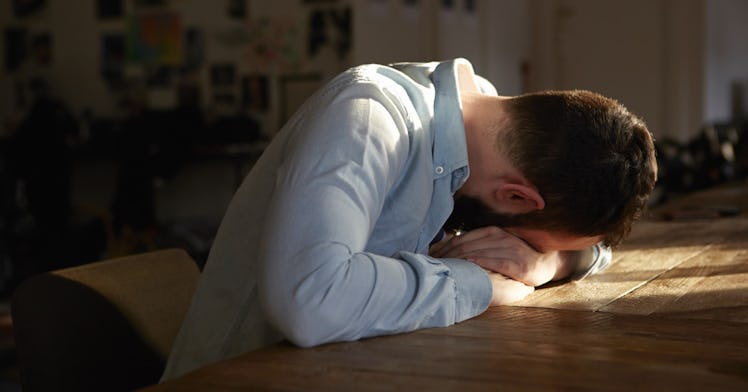How To Keep Dad Guilt From Turning Into Dad Depression
Being a new dad can be an emotional roller coaster. Be sure to lock yourself in for the ride.

There is a fine line between dad guilt and postpartum depression in new fathers, psychologists warn. Dad guilt, like mom guilt, may be associated with feelings of shame, embarrassment, and failure about living up to parenting responsibilities. But symptoms of depression in men are not far off. It can be a slippery slope for men because healthy coping skills, such as going to the gym or hanging out with friends, are rarely options for new, exhausted fathers. So the guilt and inexplicable sadness are set to snowball from there.
“Men are socialized to be more I-focused than we-focused,” says Dr. Josh Coleman, a psychologist and senior fellow at the Counsel for Contemporary Families at the University of Texas in Austin. “Making that switch once you have a child can be difficult for dads, and leads to unexpected stress.”
This guilt can be further compounded by the fact that there are aspects of new parenthood dads just cannot take part in. Like middle-of-the-night breastfeeding, or cries that only mom seems to be able to soothe, or childbirth itself. Take comfort in knowing that much of this guilt stems from falsehoods perpetuated about parenting. “There simply is no such thing as 50/50 parenting,” says Ellen Galinsky, president and co-founder of the Families and Work Institute in New York. “It’s one of the biggest myths in our culture. Parenting is a ratio that shifts all the time. Sometimes she does more; sometimes you do more. Not everything is equal at every moment.”
That said, millennial dads want to be more involved in caring for their new child, says Galinsky. “Men today have tripled the amount of time they spend with their kids compared with previous decades,” adds Coleman. So when you sense an inability to contribute, it is normal to feel frustrated or guilty.
Something else to consider: Experiencing guilt, loss, and anger could also be part of male postpartum depression (PPD). For years, medical experts thought women were the only ones who suffered from postpartum depression, but a study in the Journal of the American Medical Association found that 10 percent of new dads experience it as well, which compares somewhat evenly to the 12 percent of women showing symptoms. The condition is marked by feelings of sadness, worthlessness, and withdrawal in your new role as a parent.
What’s more, a new study from the University of Southern California finds that post-baby depression in men is linked to a drop in testosterone levels, evidence that negative emotions surrounding new fatherhood are not just in your head. They’re biochemically based.
Alleviating some of those emotions requires accepting that you had certain expectations about being a new dad that have not turned out to be true, Galinsky believes. Reconsider your belief that all parenting should be split right down the middle; try to see it as a ping-pong match, and think of ways to contribute when it’s your turn. For instance, “When the baby is crying in the middle of the night, be the one who gets out of the cozy warm bed, walks to the crib to get him, and carries him back to the mom for nursing,” suggests Coleman. “Help her, not the baby,” agrees Galinsky. “We’ve found in surveys that what women want most is a partner who takes care of them during this time.”
You can also offer to spend time alone with the baby, allowing your partner a much-needed break. “Just don’t be surprised if she goes out and calls you every five minutes to check on things,” says Galinsky. “Bite your tongue, it’s totally normal.” Take satisfaction in knowing you are doing your part to make the new parent dance a little easier — and that’s nothing to feel guilty about.
This article was originally published on